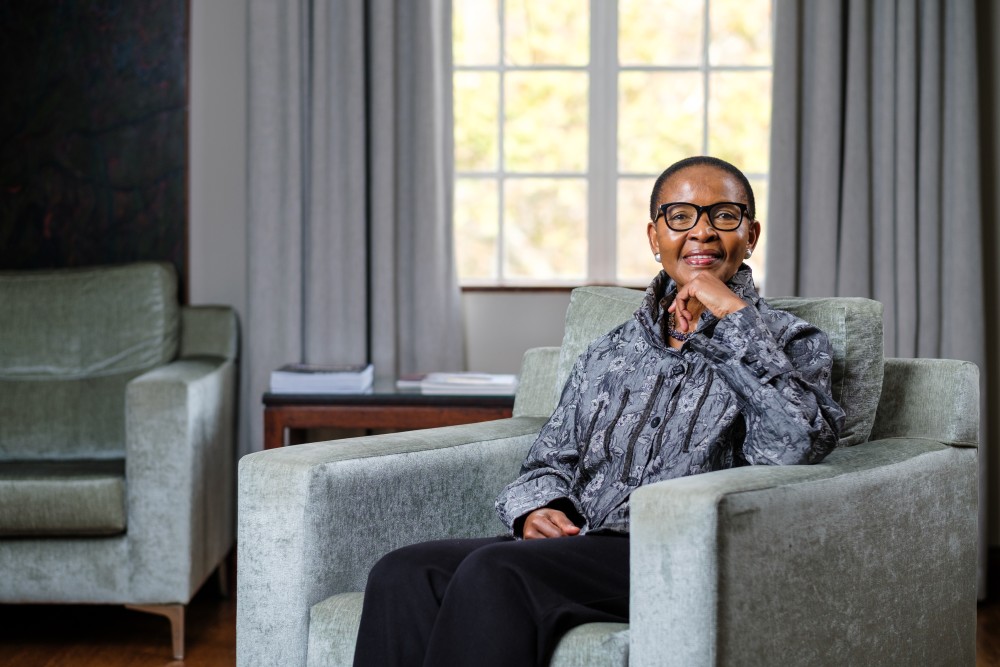
WASHINGTON — Pumla Gobodo-Madikizela, winner of the 2024 Templeton Prize — one of the world’s largest lifetime achievement awards — has worked to help South Africans overcome trauma through forgiveness and reconciliation.
In announcing the award June 4, Heather Templeton Dill, president of the John Templeton Foundation, said this year’s winner “has a remarkable grasp of the personal and social dynamics that allow for healing in societies wounded by violence. As a psychologist, scholar, and commentator, she has served as a guiding light within South Africa as it charts a course beyond apartheid.”
Gobodo-Madikizela, 69, is a professor and research chair in studies in historical trauma and transformation at South Africa’s Stellenbosch University. She was also a member of the Human Rights Violations Committee of South Africa’s Truth and Reconciliation Commission that worked to address apartheid’s injustices.
Her 2003 book, “A Human Being Died That Night,” recounts her conversations with the former commander of state-sanctioned death squads, Eugene de Kock, and argues for the possibility of remorse, accountability, and forgiveness.
Dill said that the awardee’s insights “into the mechanisms of trauma and forgiveness in post-apartheid South Africa have created a globally recognized model for social healing in the aftermath of conflict,” which she has described as “the reparative quest.”
“Her achievements mark her as a leading figure in understanding and confronting the deeply rooted psychological scars borne by those who experienced unimaginable loss,” Dill added.
Gobodo-Madikizela said in a statement after she was announced as the recipient of the prize named after the investor and philanthropist Sir John Templeton, that in her work she “learned that ordinary people, under certain circumstances, are capable of far greater evil than we could have imagined. But so are we capable of far greater virtue than we might have thought.”
She said her research has been “based on this possibility of human transformation, on probing deeper to understand the conditions necessary to restore the values of what it means to be human — to want to preserve the dignity and life of the other.”
The prize winner was born in Langa, one of the oldest townships designated for black residents outside Cape Town, South Africa. Growing up under apartheid, she witnessed segregation, discrimination, racism, and state brutality.
Her experience prompted her study, and she earned a master’s degree in clinical psychology from Rhodes University, focusing on the effects of apartheid on the psychological well-being of black South Africans. She then did further study and research on violence for her doctorate in psychology at the University of Cape Town.
In the 1990s, with the end of apartheid, Gobodo-Madikizela joined the Truth and Reconciliation Commission and served as the chair of the Human Rights Violations Committee, working with Archbishop Desmond Tutu. Her interactions with apartheid-era perpetrators, including de Kock, a former police colonel who was nicknamed “Prime Evil,” led her to grapple with the profound question of whether forgiveness could be extended to those who had committed heinous crimes.
She said she feels “a deep sense of gratitude” for the Templeton Prize and said it opens possibilities of continuing this work with future leaders. She plans to allocate some of the $1.4 million prize money to support scholarships and programs at Stellenbosch University, including research projects that examine questions related to violent histories and repair.
Gobodo-Madikizela has stressed that the severing and repair of human relationships is an inherently spiritual process. “When people are traumatized, there is a rupture of the spiritual connection between us as human beings,” she said in a video statement.
“And so, when conditions are created to repair the rupture, we call on the spiritual, the powerful spiritual connection of humanness to another human — bone of my bone, spirit of my spirit — that beckons us to connect at that level. There’s something about that moment, that has the power of a presence,” she said.
